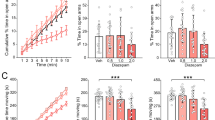Abstract
Rationale: The elevated plus-maze and the light/dark box are two established anxiety tests in rodents, which are useful to screen putative anxiogenic effects of drugs. Objective: Caffeine is well known to promote anxious behaviour in humans and animal models, but the precise site of action of the drug is still a matter of debate. The present study investigated whether the anxiogenic effects of caffeine observed in mice depend on the blockade of A2A receptor. First, the effects induced by the non-selective drug caffeine were compared with those elicited by two selective A2A receptor antagonists over a wide range of doses in the same experimental conditions. The effects of A2A or A1 adenosine receptor agonists and of a selective A1 adenosine receptor antagonist were also investigated. Second, wild-type and A2A receptor knockout mice offered another approach to delineate the role played by A2A receptor in caffeine’s anxiogenic effects. Methods: Mice were exposed to the elevated plus-maze or to the light/dark box for 5 min after acute or chronic administration of tested drugs. Results: Caffeine acutely administered (50 or 100 mg/kg IP) induced anxiety-like effects in both procedures. Its chronic administration (50 mg/kg IP twice daily) for 1 week or consumption in the drinking water (0.3 g/l) for 8 days or 2 months were also anxiogenic in the plus-maze test. The A2A receptor antagonists ZM241385 (up to 60 mg/kg IP) and SCH58261 (up to 10 mg/kg IP) were devoid of acute effects in both tests. One week administration of ZM241385 (30 mg/kg IP) or SCH58261 (3 mg/kg IP) had no effects in the plus-maze test. An antagonist (DPCPX) and an agonist (CPA) at A1 receptors had no acute effects on anxiety-related indices, whereas an A2A receptor agonist (CGS 21680) displayed non-specific motor effects in the plus-maze test. Acute administration of caffeine (50 mg/kg IP) induced no clear-cut anxiety-like effects in the plus-maze test in A2A receptor knockout mice that exhibited higher basal anxiety levels than wild-type mice. Chronic administration (50 mg/kg IP twice daily) for 1 week elicited less anxiety-like behaviour in A2A receptor knockout than in wild-type mice. Conclusions: Adaptative mechanisms following mutation in A2A receptors or their long-term blockade after chronic ingestion of caffeine may be responsible for increase proneness to anxiety. However, the short-term anxiety-like effect of caffeine in mice might not be related solely to the blockade of adenosine A2A receptors, since it is not shared by A2A selective antagonists.
Similar content being viewed by others
Author information
Authors and Affiliations
Additional information
Received: 21 March 1999 / Final version: 24 June 1999
Rights and permissions
About this article
Cite this article
Yacoubi, M., Ledent, C., Parmentier, M. et al. The anxiogenic-like effect of caffeine in two experimental procedures measuring anxiety in the mouse is not shared by selective A2A adenosine receptor antagonists. Psychopharmacology 148, 153–163 (2000). https://doi.org/10.1007/s002130050037
Issue Date:
DOI: https://doi.org/10.1007/s002130050037




